Towing with an electric car or hybrid – can I tow a caravan?
Thinking about switching to an EV but concerned about towing? We answer your burning questions
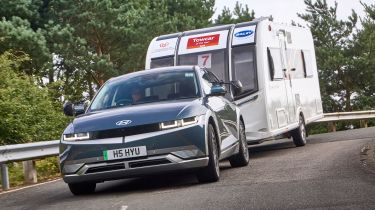
Electric cars and towing haven’t always gone hand in hand. Some of the earliest EVs hardly had the grunt to get out of their own way, let alone pull a caravan or trailer, but things are different today. There are plenty of electric, hybrid and plug-in hybrid cars that are capable of towing heavy loads, although there are a few extra things to consider.
Generally, the best tow cars are still powered by diesel or petrol engines. They’re usually powerful enough to pull a heavy trailer, but they’re often lighter than an equivalent electric or hybrid car. That’s important, as the heavier your car and trailer combination, the more stress on your car’s brakes and engine or motors.
 Top 10 best electric SUVs – the ones to buy in 2025
Top 10 best electric SUVs – the ones to buy in 2025
That said, some of the best electric and hybrid tow cars can still pull a respectable weight figure. There aren’t any EVs that can pull the maximum 3,500kg capacity yet, but some can still manage up to 2,500kg – more than enough for most caravans and trailers.
For anyone that wants to tow a caravan or trailer with an alternatively-fuelled vehicle, the Caravan and Motorhome Club recommends plug-in hybrids – these cars have the best combination of performance and economy. The best plug-in hybrid tow cars still have a powerful engine under the bonnet to provide the majority of pulling power, but their electric assistance can improve fuel economy when you’re not towing.
Be aware, however, that your car’s electric range will be significantly shorter while you’re towing. You can usually find out whether a car can tow before you buy it by checking out a manufacturer’s price lists and brochures, in the technical specs section.
Read on for more information about towing with a hybrid, plug-in hybrid or electric vehicle, and how to choose the right car offering the best compromise between low emissions, fuel economy and towing capacity if you want to regularly transport a trailer.
Why can’t many electric cars tow a trailer?
If you’re shopping for an electric car, you’ll have noticed that many are only rated for towing small loads, or aren't even rated at all. This is especially true for electric superminis or hatchbacks – but why is this?
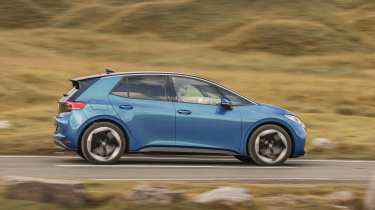
When every car is designed and engineered, the manufacturer works out exactly how much it can tow and establishes a legal towing limit in a process known as homologation. For customers who want to tow, the two figures that matter most are the maximum weight limits for towing an unbraked trailer and a braked trailer. If a car doesn’t have these figures published, it usually means the manufacturer deems it unsuited to towing – and this is the case with most electric cars.
There are a few reasons why electric cars are usually unable to tow. Firstly, the battery pack fitted in an electric car is very heavy. As an example, while a 1.2-litre petrol Renault Clio supermini can weigh as little as 1,110kg, the similarly sized electric Renault 5 weighs up to 1,460kg, with the battery pack coming in at 297kg alone.
With this much weight on board, there’s less capacity to deal with the extra weight of a trailer, which could put too much strain on components like the brakes. As a result, the Clio is rated to tow a braked trailer up to 900kg, while the electric 5 is only rated for 500kg despite having more power and torque.
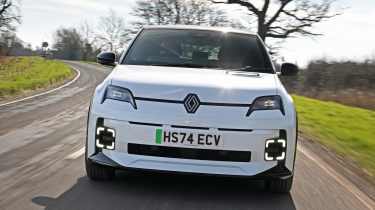
A second reason often cited by manufacturers is that towing could damage the electric powertrain itself. While the instant torque and impressive power of electric motors can be ideal for accelerating with a trailer, the main issue comes when slowing down. Unlike a conventional internal combustion engine, electric motors can instantly switch to become generators as you come off the accelerator pedal, converting kinetic energy into extra charge for the batteries and slowing the vehicle down. Towing a heavy trailer down a steep hill will provide lots more kinetic energy than normal, which could overwhelm the electrical system.
Does towing affect an electric car’s range?
Yes, towing a trailer will have a big impact on an electric car’s range. The extra weight and aerodynamic drag of a big trailer or caravan means the electric motors have to work a bit harder to keep you moving, burning through your battery’s precious charge level at a faster rate.
But the same is true for a petrol or diesel car – towing a trailer will result in worse fuel economy, meaning you have to stop and fill up more often. The problem for EVs comes down to ‘range anxiety’. Many drivers are uncomfortable relying on the UK’s public charging network, which can be expensive – especially if you’re having to stop every 150 miles or so.
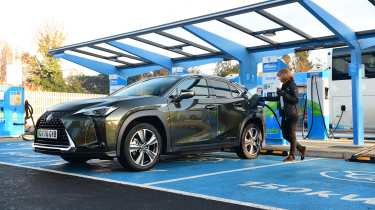
It’s one reason why many manufacturers don’t put electric models through the homologation process for towing. As most EV manufacturers are already struggling to combat the stigma of ‘range anxiety’, the possibility that towing could leave drivers stranded is a big risk.
What are the best electric cars for towing?
There was a time when the Tesla Model X was the only electric car homologated for towing. It’s since been discontinued in the UK, but technology improvements have allowed many more electric cars to tow, including the smaller Tesla Model Y. Here are some electric cars with the highest towing capacities:
- Kia EV9 AWD – 2,500kg
- Hyundai Ioniq 9 – 2,500kg
- BMW iX – 2,500kg
- Audi Q6 e-tron Quattro – 2,400kg
- Lotus Eletre – 2,250kg
- Polestar 3 AWD – 2,200kg
- Volvo EX90 AWD – 2,200kg
The Model Y – Europe’s best-selling EV – can tow up to 1,600kg, which is enough to tow a small trailer or caravan. That’s still some way off the electric cars with the highest tow capacities – the Kia EV9, BMW iX and Hyundai Ioniq 9 can all pull a braked trailer up to 2,500kg.
Other strong performers include the Audi Q6 e-tron, which can tow up to 2,400kg, and the Polestar 3 and Volvo EX90, both of which are rated for 2,200kg. However, these EVs are at the expensive end of the spectrum and, for many drivers, a tow capacity of over two tonnes will be overkill.
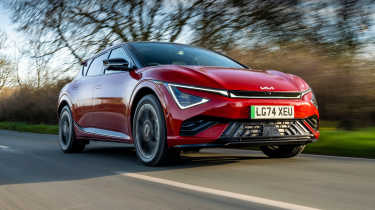
For a more affordable electric tow car there’s the Kia EV6, rated at 1,800kg. The Smart #1 Pro+ and Hyundai Ioniq 5 Long Range can both tow up to 1,600kg which will be plenty for most drivers. The most affordable electric car rated to tow over 1,000kg is the £36k Leapmotor C10, which can tow up to 1,500kg.
There are only a handful of electric MPVs that make for good tow cars. The Volkswagen ID. Buzz is the most capable, with a maximum load of between 1,000kg and 1,800kg depending on trim level. The Vauxhall Vivaro e-Life, Peugeot E-Traveller, Citroen e-SpaceTourer and Toyota Proace Verso can all manage 1,000kg.
It’s worth bearing in mind that, while these cars can be fitted with a tow bar, in most cases this must be a factory-fit option specified at purchase due to the nature of their engineering complexity. If you’re planning to buy second hand, you’ll need to look for an electric car that already has a tow bar fitted. Otherwise, be prepared to pay up to £1,000 to have one as an option on your new car; this is the price to fit a tow bar to a Tesla Model Y.
What are the best plug-in hybrid cars for towing?
Because plug-in hybrid models offer a combination of electric technology and internal combustion engines, many of the issues faced by pure electric models are less pronounced.
For that reason, if you want to tow, protect the environment and lower your bills, a plug-in hybrid is probably your best option right now. The most affordable plug-in hybrid models are also usually a bit cheaper than their electric counterparts, too. These plug-in hybrids currently have some of the highest tow capacities:
- Porsche Cayenne E-Hybrid – 3,500kg
- Audi Q7 TFSIe – 3,500kg
- Audi Q8 TFSIe – 3,500kg
- Volkswagen Touareg eHybrid – 3,500kg
- Land Rover Defender – 3,000kg
- Range Rover Sport – 3,000kg
- Range Rover – 3,000kg
- Mercedes GLE 350 de – 2,700kg
You’ll notice that the cars above are all pretty expensive, with even the cheapest model costing around £70,000. On the other hand, the MG HS is one of the most affordable plug-in hybrid cars you can buy, and it’s still rated to tow up to 1,500kg. If you need to tow a bit more than that, the plug-in hybrid Skoda Kodiaq can pull 1,800kg, and it’s one of our favourite family cars on sale today. There’s also the Ford Kuga, which tops both with its 2,100kg towing capacity.
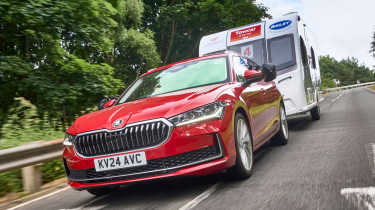
If you don’t want an SUV, but still want a plug-in hybrid that can tow, the executive saloon and estate class could provide the answer; the Volkswagen Passat and Skoda Superb can tow up to 1,800kg, as can the upmarket Mercedes C-Class.
The Mercedes should be a particularly adept tow car, because not only does it have plenty of power, it’s also fitted with air suspension. The latter can help avoid the rear suspension sagging when towing a heavy load, improving ride quality and safety. With an even higher towing limit, the Volvo V60 estate impresses, with its ability to tow up to 2,000kg.
Some of the most capable of the plug-in hybrids, however, are the Audi Q7 TFSIe, Volkswagen Touareg eHybrid and the Porsche Cayenne E-Hybrid. All three cars share the same underpinnings, and can tow up to the legal maximum of 3,500kg. This is largely down to their powerful 3.0-litre V6 petrol engines and electric motors, combined with standard four-wheel drive. They also have enormous brakes and weigh a not-insubstantial 2.5 tonnes, so keeping control of a large trailer and stopping it should be easy enough.
What about the best hybrid cars for towing?
Despite the fact self-charging hybrid cars have been around for longer than plug-in hybrid models, the latter are now more common. In fact, if you want a regular hybrid costing less than £30,000, your options are pretty limited. The self-charging cars below have some of the highest towing capacities on the market currently:
- Ford Kuga AWD – 2,100kg
- Lexus RX – 2,000kg
- Toyota RAV4 AWD – 1,650kg
- Lexus NX – 1,500kg
- Hyundai Tucson – 1,360kg
- Hyundai Santa Fe – 1,100kg
- Kia Sorento – 1,100kg
The Ford Kuga sits at the top of the pack with a towing capacity of over two tonnes, matching its plug-in sibling. It comes with some handy towing tech, too, including extended blind spot monitoring and a sat-nav that will take into account tow-friendly routes.
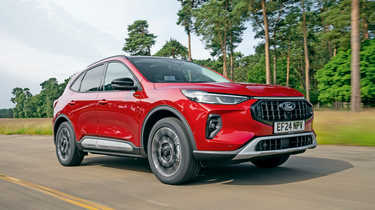
Toyota and Lexus are famous for their bulletproof self-charging hybrid systems, and they’re fairly capable at towing, as well. They’re some of the only self-charging hybrid SUVs available, along with a handful from Hyundai and Kia, although models from those brands aren’t rated to tow as much.
Renault and Dacia make some of the most affordable self-charging hybrids today. The Renault Captur E-Tech and Dacia Duster E-Tech, while cheap, can only tow up to 750kg so will be a bit limited for some buyers.
The future of alternative-fuel towing
Martin Spencer, technical manager for the Caravan and Motorhome Club, told us: “We’ll see a bit of a shift from diesel to petrol in the shorter term (next five to 10 years), but the main trend will be towards hybrids, with a smaller steadily growing proportion of electric cars.”
And while there’ll be a transition period, Spencer sees a bright future for towing heavy caravans with alternative-fuel vehicles. “They’re particularly good for easy low-speed manoeuvring, hill starts, acceleration and hill climbing," he said. "Hybrids enable you to have a combination of the performance of a larger conventional engine with the economy and low emissions of a smaller one – a great benefit all round.
“The range of more affordable, towing-capable hybrids is increasing almost every month. Those hybrids with an electric-only mode often have very limited electric-only range, especially when towing. Electric range is also likely to increase with new technology developments before very long, though”.
Check out our list of the best cars for towing.
Recommended

New Subaru Trailseeker revealed as rugged electric SUV with 375bhp

New Subaru Solterra brings more range, power and polish
Most Popular
Tips & advice

Car dashboard warning lights: what does each symbol mean?

Electric car charging stations: public networks, charger types, apps and maps








